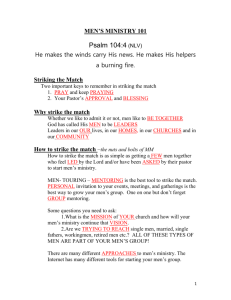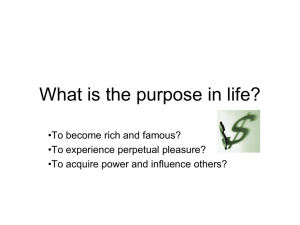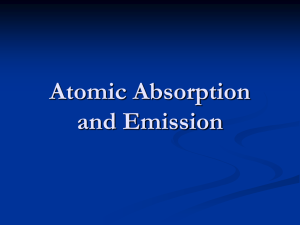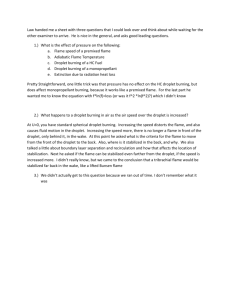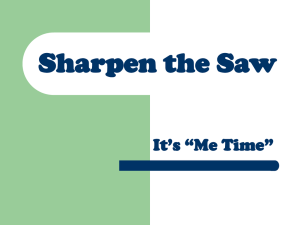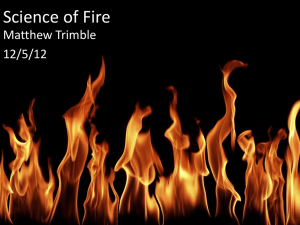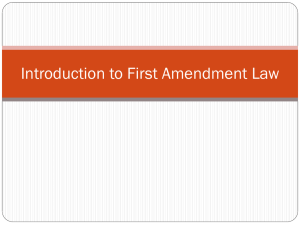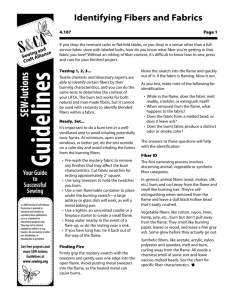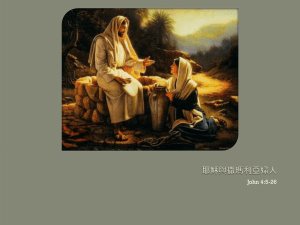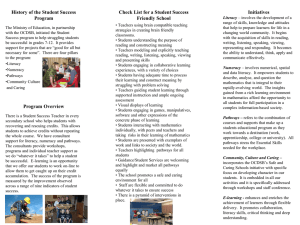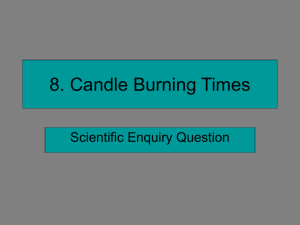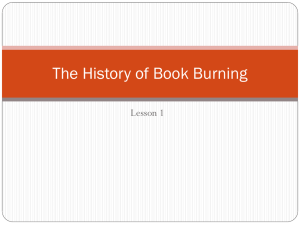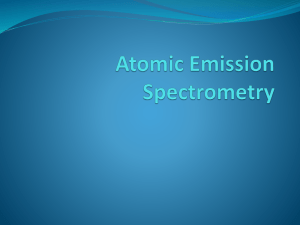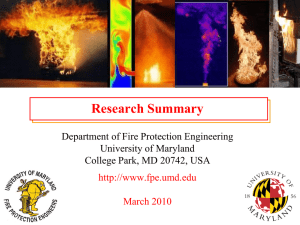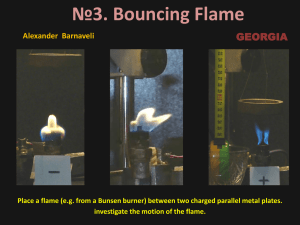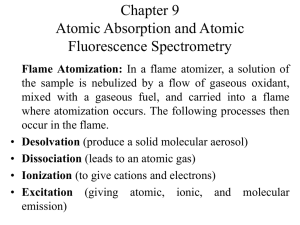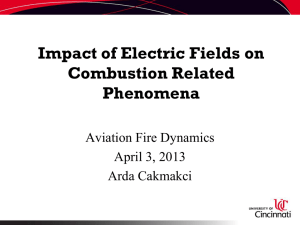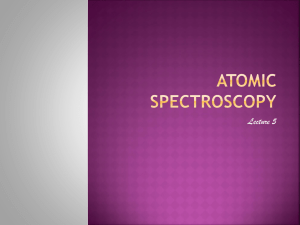Student Success in the OCDSB
advertisement
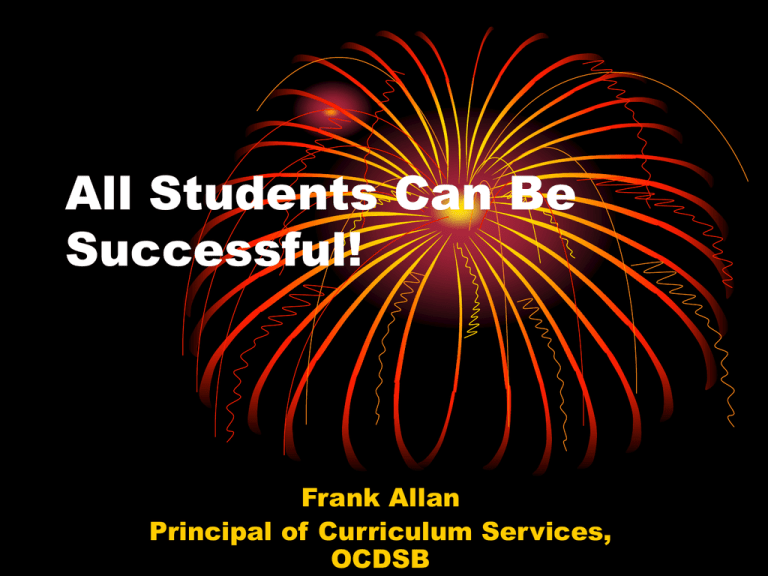
All Students Can Be Successful! Frank Allan Principal of Curriculum Services, OCDSB What will make this happen? You need to: • • • • • Have a Vision, Have a Team, Have Dedicated Teachers, Focus On Student Success, Recognize the Barriers to Success, • Remove Those Barriers, • Provide a Positive Learning Environment. 1. A vision that all students can be successful. • What precedes a vision for student success? What precedes vision! Lesson from Popeye! “That’s all I can stands, I can stands no more!” It’s that passionate discontent with the status quoThat drives vision! A Successful Pathway for Every Student • • • • Independent Living University Apprenticeships School to Work (Nick/Steve/Gloria/Sam) • College The Nine Indicators • Action Plan 04/05 introduced Key Indicators • • • • Grade 9 and 10 Credit accumulation Pass Rates in Compulsory Courses- 9 & 10 Literacy Success Rate (OSSLT, OSSLC) Workplace Preparation, College Preparation, New Guidance and LDCC courses running and overall student enrolment • Annual School Leaver Rate by % • Number of Grades 7 & 8 students at risk as indicated by working at Level 1 or below in English and/or Math A vision that: • All students can learn. • School makes the difference between success and failure. • Teachers must recognize that students learn at different ways and at different rates. • All students are capable of achieving at a higher level when challenged by an excellent teacher. A vision that: • Student achievement is directly related to high expectations and letting students know that they are all believed capable of meeting basic objectives, and no one is expected to fail. • Recognizes that parental involvement is an important factor in student success. A vision that: • Schools must nurture each students talents • Schools must be safe havens for student’s minds, hearts, and souls. • Graduates must be prepared to face the challenges that life presents and be filled with respect for the majesty of the world of which they are the custodians. A vision that: • Recognizes new opportunities must be provided for students to experience success in spite of past failures. • Looks for new programs which engage student who have become disengaged from learning and in some situations from life. I will believe • • • • • I will believe Every child I teach Is a flame of hope Burning brilliantly, A strong heart and mind • Seeking out my hand • It is within my reach • This I believe • • • • • • • • In the middle of each town In the heart of every school Behind a desk in a classroom Is a single child for whom This moment is the difference Where the road is mapped and planned This childhood waves goodbye But not yet a woman or a man. I will believe • • • • • I will believe Every child I teach Is a flame of hope Burning brilliantly, A strong heart and mind • Seeking out my hand • It is within my reach • This I believe • • • • • • • • I am here by choice Right where I want to be The challenge is great To inspire and lead But how proudly they achieve How profoundly they comprehend How their laughing spirit soars And I promise again! I will believe • • • • • I will believe Every child I teach Is a flame of hope Burning brilliantly, A strong heart and mind • Seeking out my hand • It is within my reach • This I believe I will believe • • • • • I will believe Every child I teach Is a flame of hope Burning brilliantly, A strong heart and mind • Seeking out my hand • It is within my reach • This I believe I will believe • • • • • I will believe Every child I teach Is a flame of hope Burning brilliantly, A strong heart and mind • Seeking out my hand • It is within my reach • This I believe Looking Through The Big Picture Windows The Real Big Issues • What is your world view? What gives your life meaning? • What are the global issues that we need to address to sustain our global civilization? • What are the societal issues that impact us and our student’s learning? OCDSB’s Big Picture • How do student’s learn? (Your professional knowledge) • What do you want students to know? (Provincial Curriculum) • How do we know they have learned it? (Assessment & Evaluation, Data Analysis) • What do we do if they have not learned it? (Interventions/Secretariate/ Student Success/Learning to 18) • What do you do if they have already learned it? Your School’s Big Picture • We believe …… • Do we offer a caring and safe place for all of our students? • Does every teacher understand what each student should know and be able to do after completing the unit of instruction, course, and grade level? • What systems are in place to monitor each student’s learning on a timely basis? • What happens if a student is not learning. How does the school respond? • What systems are in place to provide these students with additional time and support? Your Personal Big Picture • My world view involves…. • Here is what I believe about student learning… • Here is what I want my students to know… • I will know they have learned it by… • If they have not learned it this is what I will do… • I am going to do the following to become better at what I do.. 2. Recognize that it is a team effort! • Building your Team! – A lesson from the Redwoods. • Someone must be there for each student. Building our Team! – A lesson from the Redwoods. Building our Team! – A lesson from the Redwoods. Cheers Cheers Theme Song “Sometimes you want to go where everybody knows your name, and they’re always glad you came; You want to be where you can see, Our troubles are all the same; You want to be where everybody knows your name. “ 3. Recognize that dedicated teachers are essential for “at risk” students to be successful. “I have come to a frightening conclusion. I am the decisive element in the classroom. It is my personal approach that creates the climate. It is my mood that makes the weather. As a teacher I possess tremendous power to make a child’s life miserable or joyous. I can be a tool of torture or an instrument of inspiration. I can humiliate or humour, hurt or heal. In all situations it is my response that decides whether a crisis will be escalated or de-escalated, and a child humanized or de-humanized.” Haim Ginott - 1972 4. Focus on what makes a student successful. Success = Competence (Cognitive, Social, Physical) Character (knowing your strengths, weaknesses) Caring/Compassion (Life is centered in your heart) Connections (to adults other than family) Confidence (rather than self-esteem) Students will be successful if they have meaningful relationships with others and feel their life is significant as they fully engage in their community. • The challenge for us as educators is to intervene with students who have not been successful and leave them with a better life trajectory than when they came into our care. “I read Basher Five-Two. It was a good book. It was about how this fighter pilot got shot down behind enamy lines and had to survive by useing survieval skills like eating bugs and digging a hole he could stay in at night and he has ants all over him but couldn’t move or make any noises because the enamy soltiers where everywere. He had to have faith that his troop would come back to get him and save him. I would like to have the same fathe that he has got because I am down behind enemy lines to. I got things that make me want to cry but if I cry I get punched and told I’m a crybaby sissy. He has alot of curage because in the tuf times he kept going. I keep going alot of times to. But how long would his curage have lasted if noone had come to get him? That’s what I want to no. How long does you’re curage last when the troops don’t come?” Derek – a grade 8 student of Kylene Beers 5. Recognize the Barriers to Success. (From the work of Bruce Ferguson) • A. Home, family, peer, and school influences. • B. Societal/cultural and community influences. • C. Individual characteristics. • D. School Climate Factors that contribute to “risk”. 6. Recognize the Factors that Reduce Risk - Students engaged in school life -parental involvement -moderate levels of employment -a positive school culture ( mixing students of different backgrounds, appropriate instruction, relevant curriculum, and community educational aspirations). 7. Provide a positive learning environment. • Promote literacy • Promote numeracy • Promote alternative pathways to successful employment. • Provide Culture, Caring and Community. 8. Three Final Questions for us as Educators. • What can I do to energize this student? • Is there anything in this building that would energize this student? • Is there anything in our school board that would energize this student? The Footprint you leave behind…. Dear Mr. Allan Even when I was at my worst I could always count on a smile & hello from you. From the day I met you I have never doubted your deep concern and caring for every student at this school. Don’t forget us! Love, Anjali In Bruce Ferguson’s study there was not a single student who did not think that finishing high school had a positive result! Let’s help them do it! The sun is rising on a new day for them – and us! From the seed we plant today, grows the beauty we enjoy in the sunshine of tomorrow.
